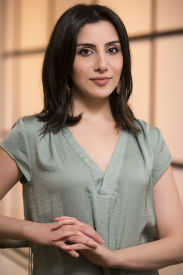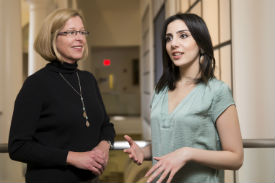
When the day came that she knew she needed to change her life, Carol Eid was working as a computer engineer in her native Lebanon.
“When I finished high school, I decided to study computer engineering,” says Eid, who considers herself an artist at heart. “I didn’t really know what that was exactly nor did I like working with computers, I just wasn’t sure what was the best choice to make at that time. I think I decided to pursue that major out of the fear that I might later regret not choosing it, not because I really wanted it for myself—I yielded to peer-pressure. My teachers and family told me, ‘You’re clever. You get things quickly. Go into engineering.’ Even while studying computer engineering, although I was achieving very high grades, I never felt passionate about it.
“So, I finished, but the pain continued. I started working, and I couldn’t have felt more alienated from myself. One day, I read this quote on a client’s desk: ‘Everything that is worth something costs something.’ I realized that if I were to achieve something meaningful to me, I would have to accept paying some costs, and I was willing to do that. I asked myself what I really wanted to do, and I felt I had a passion to discover how I can design educational curricula to help students develop their natural talents and capabilities and achieve a deep understanding of themselves and what they want from life—not just to do something for economic reasons. I think the fact that I didn’t like school, that I always felt it took something from me as an artist and a person, led to where I am now.”
“Now” is as a Fulbright Scholar studying in the Learning and Design program at Vanderbilt’s Peabody College. In 1945, Senator J. William Fulbright introduced a bill in the U.S. Congress that called for funding the “promotion of international good will through the exchange of students in the fields of education, culture and science.” Operating in more than 155 countries worldwide now, the Fulbright Foreign Student Program enables graduate students, young professionals and artists from abroad to study and conduct research in the United States.
“I was particularly interested in the Fulbright scholarship since it offered me an opportunity to benefit from both a cultural exchange and the major that I wanted to pursue,” Eid says. “I think the committee that reviewed my application sensed how much I wanted to follow this course. My application was accepted, I went through several phases of interviews and examinations, and here I am now.”
In deciding where to study on her Fulbright, Eid sought a program that allowed her to be flexible in the courses she took. Peabody offered the kind of environment that fit her requirements.
“I wanted to study things related to the person, the human, before I design curricula or educational policies,” she says. “I wanted to understand how the child functions and learns, how context shapes human learning, development and creativity, so I picked my courses accordingly. And Peabody has an excellent reputation in education. That was something I was definitely looking for.”
For Eid, that emphasis on how education and learning should be feels just right. Her professors, she says, stress helping students develop their knowledge and grow as educators.
The three-semester Learning and Design program in Peabody’s Department of Teaching and Learning focuses on understanding how learning happens across diverse settings and on how to bolster and enhance that learning. Courses include attention to contexts, the diverse places in which learning can happen—physical spaces like schools or museums or aspects of places that affect learning such as play, poverty, teaching, or technology. The program grounds students in understanding learning and designing for a variety of learning environments. Students also map coursework to their interests and professional intentions, whether that be supporting learning in a school setting or informal learning environments. They can tailor their studies by choosing concentrations that include Math and Science; Literacy, Poverty and Intervention; or Learning in Context; the concentration Eid follows.
With the guidance of Professors Kristen Neal and Melissa Gresalfi, program co-directors, Eid chooses courses to fit her interests and needs.

“I think the access students have to faculty who are conducting cutting edge research on learning—as well as the diversity of the student cohort—are incredible assets,” Neal says. “Carol’s rich experiences and those of others enhance the program experience.”
Now in only her first semester, Eid isn’t sure yet what her plans are after she completes her Peabody studies.
“I might go for a Ph.D., or I might start working,” she says. “But I think in the long term, I would like to work in educational reform and policy, especially in Lebanon. Unfortunately, the current Lebanese curriculum trains students to be passive recipients of knowledge and to develop rigid belief-systems. This further promotes sectarianism, which is at the heart of almost all social and political dilemmas in Lebanon. We also have challenges related to teacher professional standards in the public educational sector. And now, with the great number of refugees who fled the persecution and war in Syria, we have all these kids, and the struggle is to incorporate them in a curriculum that can actually help them.”
As for the art that was at the core of much of her unease as a student, the art she felt school made her abandon, Carol Eid isn’t forgetting about that.
“In coming here, I had to decide whether I wanted to pursue something related to education or something artistic,” she says. “I felt that during this time, I want to invest myself in something that requires the accumulation of a particular type of knowledge and analytical thinking rather than visual thinking. But part of me still craves art. I need to go back to drawing and my other artistic activities, maybe in a few years.”
The big change in career has also meant a dramatic change in environment. Although she enjoys Nashville, Eid finds the change from life in Lebanon challenging.
“When you move to another place, it is awkward,” she says. “It feels as if you’re leaving your body. As I once put it, a lot of who we are is our social identity. We exist in relation to a certain society, and in another social context, we will have to weave a new identity and exist differently.
“So I miss my family and friends, the places and everything. But what I’m doing right now—I’ve thought about this—maybe this is the first time in my life that I feel I’m exactly where I’m supposed to be and doing something that really fits me and fits my interests. I can see how much I’m motivated to be here compared to how motivated I was in my undergrad years. This is something I haven’t experienced for a long, long time.”